Edward Furlong
[2017 Jan] Hollywood terminates Edward Furlong (John Connor)
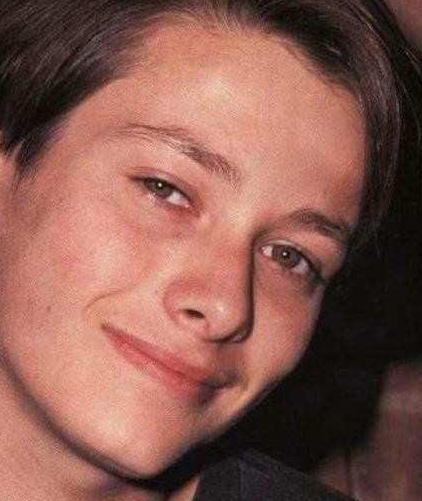
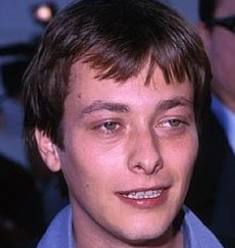
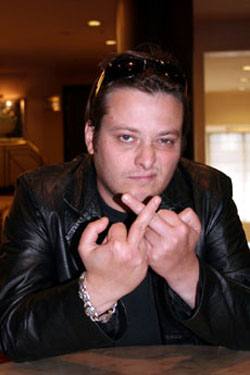



Before and after
(visual)
X sign
Hand sign (Satanic/horn)
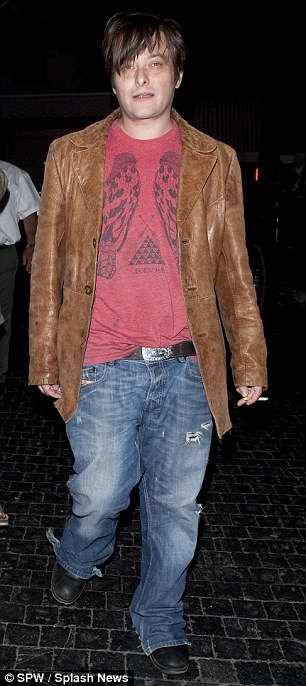
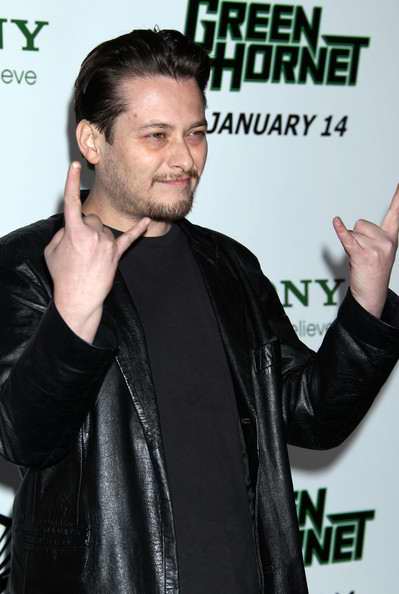

"ENTERTAINMENT WEEKLY
A PATH TO DISASTER
Wealth and stardom have made a disturbing difference in the life
of Ed Furlong. The streetwise child first seen in “Terminator 2” is now 16
and living in L.A. with a 29-year-old woman who used to be his tutor. His
family can’t control him. The law can’t touch her. And those who’ve seen
Eddie with his older woman are torn: will Jackie Domac prove to be his
downfall or his savior?
April 15, 1994
On Jan. 7, 1993, director Tony Bill sat down in his Venice, Calif., office
and addressed a letter to Edward Furlong's agent. Bill had recently returned
from the Utah set of A Home of Our Own, a family drama starring Kathy Bates
as an impoverished mother of six. He wrote: "Eddie Furlong didn't choose the
movies, the movies chose him and it has taken a heavy toll."
Bill, whose experience directing young actors dates back to 1980's My
Bodyguard, then described a child cut adrift. "I found it astounding and
dismaying," he wrote, "that in over eight weeks of shooting, not once did
his guardians ask me about his performance, his abilities, or his problems."
"Who's taking care of this kid? At fifteen, he is certainly not," the
director wrote. "His guardians do just that: guard him... from criticism,
from hard work, from self‑awareness."
Bill went on to urge "a thorough regimen of physical exercise," coordination
therapy, and acting classes. And then he wrote: "Be assured that I'm not
criticizing Eddie. The deck has been stacked against him and he is truly a
victim."
Warnings don't come any clearer. And 15 months later, his concern is still
vivid. "In 30 years," Bill says now, "I've never worked with a kid who was
so clearly on a path to disaster."
Furlong's life has always had its private turmoil. When the casting director
of Terminator 2 first spotted him standing on the steps of the Pasadena Boys
Club in September 1990, Edward Walter Furlong was a guarded, slight
13‑year‑old boy whose mother, at a difficult point in her life, had recently
let him live with relatives. One year later, the world knew him as the
sweet‑faced kid who taught Arnold Schwarzenegger how to act human, and
Furlong had suddenly been launched into a Hollywood career for which he and
his now‑warring family had no preparation. His talents have continued to
impress ‑in Pet Sematary Two, American Heart, and A Home of Our Own. But
behind the scenes, Furlong has been at the center of a bickering triangle of
guardians whose charges and countercharges concerning abuses of money and
power make a textbook study of the ways in which a child actor can find
himself with nobody to protect him. Among those vying for the role:
- Eddie's mother, Eleanor Torres, 35, who in May 1990, a year after
separating from his stepfather, Moises Torres (Eleanor won't say who Eddie's
father is), let Eddie live with her siblings. She regained nominal
guardianship of her son last Aug. 24.
- Eleanor's sister, Nancy Tafoya, 34, and her half brother, Sean Furlong,
25, who took in Eddie in May 1990, won guardianship of his person in
September 1991, then lost it last Aug. 24.
- L.A. lawyer Bruce Ross, 47, who has served as the court‑appointed guardian
of Furlong's finances since September 1991.
- Jacqueline Louise Domac, 29, who was Furlong's stand‑in on the set of
Terminator 2, became his private tutor in September 1992, and now, to all
appearances, is his live‑in lover. Last September she brought him to her
L.A. home‑to stay.
After much deliberation, Furlong opted not to talk about the issues raised
here. His publicist states: "Eddie does not want to be interviewed [for) an
article involving so many misstatements about his personal life." Domac also
declined to comment.
Shortly after signing Edward Furlong to star opposite Schwarzenegger in
Terminator 2, director James Cameron called Sean Furlong, who recalls him
asking, "Do you guys know what you're getting into?" Someone might well have
posed the same question to Cameron, for as T2 began production, a fierce
custody fight was brewing between Torres and her siblings, which raged for
the duration of the T2 shoot, each side accusing the other of being more
interested in money than in Eddie. "It was extremely upsetting to Edward,"
says B.J. Rack, one of T2's producers. "Here was this kid who had never been
on a movie set, subjected to five months of the most high‑profile
experience one could imagine, then not knowing who his legal guardians
were. But he was okay. I was amazed at his ability to put it behind him and
perform."
In September 1991, nearly three months after T2 was released, that battle
ended and another began: Sean Furlong and Tafoya retained custody of Eddie,
but the court gave Bruce Ross control of his estate, an arrangement that
would generate constant friction. A little more than a month into the joint
guardianship, Sean and Nancy, who had quit full‑time jobs as counselors for
social‑service agencies to devote themselves to Eddie's career, had attorney
Marc Berry outline their complaints in a letter to Ross. "As you know,"
Berry wrote, "Sean and Nancy are not wealthy, and cannot provide Eddie with
a home... equivalent to his status in the entertainment community, causing
much embarrassment and humiliation which must be avoided hereafter."
There were other humiliations ‑bounced checks, no medical insurance‑ the
product, Sean Furlong and Tafoya claim, of a tug‑of‑war with Ross over
escalating expenses that the pair said couldn't be covered by
production‑company per diems and the daily payout of $75 to $240 that
Eddie's estate gave them to accompany their ward to film sets. The estate
also covered more than half the rent on a new house, an expense that Sean
Furlong and Tafoya say was needed to get Eddie out of the gang‑infested
neighborhood where they had lived.
"It gets incredibly expensive to keep things looking like Eddie was becoming
a star, like having nicer furniture, taking people out to dinner," says Sean
Furlong, who sports an ankle tattoo with Eddie's nickname, Pook, and claims
that his family is now $36,000 in debt from legal, medical, and living
expenses related to his nephew's career. "We did an unbelievable amount of
business in the house. Our phone bills were huge because I had to speak to
Japan [where Eddie became a pop star after T2). Eddie really wanted us to
travel with him. In 1992 we traveled 34 weeks out of the year."
Ross maintains that Eddie's career demanded only one full‑time person and
suggested the other find another job. He says he chastised Tafoya and Sean
Furlong for converting first‑class tickets to coach and using the difference
to fly friends and family to events, and for clearing such decisions only
with Eddie and not Ross, the estate's guardian. "Their standard of living
increased so dramatically," says Ross, "that for them to suggest now that it
was a financial hardship is outrageously false."
Ross was also worried about Eddie's desire that his uncle and aunt become
his managers. "It was our view from the beginning that neither was competent
to be Edward's manager, and I told them that," says Ross. "Edward wanted
them, so we discussed that possibility." With entertainment lawyers from
both sides, Ross reluctantly began to hash out a management contract for
Sean Furlong and Tafoya in April 1992.
Meanwhile, Edward Furlong's star had been rising. Terminator 2's $200
million in ticket sales had made him attractive to Hollywood: In the wake
of T2, he starred in the horror film Pet Sematary Two and opposite Jeff
Bridges in the grim street‑life drama American Heart, completing his work
without incident. But things didn't go as smoothly when Furlong signed to
play Kathy Bates' oldest son in A Home of Our Own. When shooting began in
October 1992, Jackie Domac, Furlong's onetime stand‑in who had since become
accredited as an on‑set teacher, arrived in Utah to tutor all six of the
film's underage actors. Tony Bill suspected that she had romantic intentions
toward Furlong, who was then 15. After she was discovered wrestling
playfully with Furlong and another child on the floor of her classroom, the
film's producers fired her. At the time, Tafoya and Sean Furlong did not
suspect Domac of any wrongdoing, and they chose to keep her on as Eddie's
tutor.
After Bill's letter to Furlong's agent (Scott Harris and Scott Landis, of
Innovative Artists, did not return calls for this story) reached Bruce Ross,
a frank meeting took place that included Eddie, Tafoya and her lawyer, Ross
and his lawyer, and the two other lawyers who had become involved in the
attempt to carve out a management contract. Eddie, says Tafoya, persisted in
his desire to have his aunt and uncle as managers. Ross noted that even
Eddie's mother found the decision objectionable. Eddie, according to Tafoya,
got upset that Bruce had informed his mother of issues in his life. "Bruce
said, 'She's your mother and she has a right to know," Tafoya recalls.
"Eddie said, 'But I'm the one you work for." Ross denies hearing such a
comment from Eddie. "For another thing," he says, "he's pretty nice and he
wouldn't say that."
Then, last summer, on the Montreal set of Brainscan everything fell apart
for Tafoya and Sean Furlong, and Tafoya thinks she knows why. "Before
Brainscan, I pretty much had it out with Jackie and said that there was
something very wrong and sick about their relationship." According to Tafoya,
Domac replied, "I know how much power I have over Eddie. I know I can make
him do anything I want."
When Eddie, Sean Furlong, and Tafoya arrived on the Brainscan set, a
pitched battle began between the guardians and their charge, who, according
to a draft of his contract, earned $350,000 to star in the sci‑fi thriller,
which opens nationwide on April 22. Tafoya said she and Eddie had three
fights on the set and numerous fights off the set involving discipline ‑and
Domac. "'No, you can't go visit Jackie now, you have to give your dog a
bath," she recalls saying. "That's when Eddie punched a hole in the ceiling
of the trailer‑over that. 'Eddie, you just worked 12 hours. You can't go
visit Jackie; you have to go to sleep.' 'Get off the phone with Jackie‑it's
3 a.m." Tafoya also claims she found Domac asleep in Eddie's bed.
Midway through the seven‑week shoot, the moviemakers moved to resolve what
they saw as a crisis. "Sean and Nancy disrupted filmmaking," says producer
Michel Roy. "Edward was in constant conflict with them. As a result, he had
more difficulty performing his work. At one point, the group behind
Brainscan, including me, decided the disruption was creating a major
problem.... I called Bruce Ross and said if they continued to disturb my
days, you guys are going to have to pay for it."
Within 48 hours, a court hearing, attended by counsel only, tried to devise
a solution. Ross' first suggestion ‑that Domac and Roy serve as Eddie’s
temporary guardians for the rest of the shoot‑ was nixed by the court. Sean
and Nancy contend it was Roy and Ross' way of squeezing more work out of
Eddie, while Ross counters, "That was made at Edward's specific request,
because he was under so much pressure from Sean and Nancy that he did not
want to tell them. Once this happened, I said, 'Edward, it's your call.
Unless you tell the court what you want, it's not going to happen.' He said,
'This is what I want." , On Aug. 24, Sean and Nancy were banished from the
set and Torres was reinstated as guardian of Eddie’s person. But while the
disputes raged, Furlong was making some decisions of his own. According to
family members, upon returning to Los Angeles in mid‑September, he moved in
with Domac and has since been supporting her with the $2,500 monthly
allowance that Ross and the court approved for him last November.
"Denying Edward an allowance would not result in Edward's returning to live
with his mother," says Ross resignedly. "He may end up working at McDonald's
and living in a hovel, but he's not going to go back to his mother because
of what is or is not done with his money. If you're asking, do I approve of
the situation as a parent of children myself? The answer is no. Edward knows
that. I'm not in a position to stop it."
Sean Furlong and Nancy Tafoya don't see it that way. On Jan. 5, Sean took
advantage of a change in California's law governing statutory rape, which
now permits prosecution of adult women who have sex with minors, and filed a
complaint.
The police interviewed Eddie, according to Ross, who says, "Unless the minor
complains, my understanding is they will not prosecute." L.A. police
detective Aubrey Ginsberg says only that the matter "has been adjudicated."
In addition, Sean and Nancy say they plan to challenge Domac's teaching
certificate in California and have written the state bar of California to
have Ross investigated.
In the middle of this chaos, Eddie and Domac surprised everyone by taking
off to film the family tragedy Little Odessa. On Jan. 7, he called his
mother from Los Angeles International Airport to tell her he'd taken the job
and was headed for New York ‑without her. Only then, did Ross learn of his
departure. "Our anticipation was that either Edward and his mother would go
to New York and work on the movie, or Edward would not do the movie," says
Ross. "We found out, after the fact, that Eleanor and Edward didn't work
things out and Edward left. Without telling me in advance or anyone else."
This time, Edward was on a movie set without family members, and a funny
thing happened: Nothing.
"It was a delight to work with him. He was always emotionally present. I
think he's a very accomplished actor. And, in many ways, he was the most
cooperative actor in the picture. Other than the fact that I got a Coke with
Edward after shooting, I would never have known about his family," says
Odessa director James Gray, who watched the young actor hold his own with
Vanessa Redgrave and Maximilian Schell. "His role was that of someone from a
troubled, broken family, and in many ways he used his background to his
advantage and funneled his personal tumult into the role. At 16, he's been
forced into adulthood, and he's handling it better than I would have."
And others on the set seemed to accept Domac, who no longer works as Eddie's
tutor. (His new teacher, Cheryl Steets, found him up to speed academically
when she took over last October.) Reports from the set spoke of a strong
affection between Furlong and the petite 29‑year‑old he introduced to
everyone as "my girlfriend Jackie." Between takes and drags on a Camel
cigarette, the shy high school sophomore kissed Domac, held her hand, and
ran his fingers through her hair. "I had my doubts at first, but I think
she's good for him," says Gray. "She's a stabilizing force and she cares for
the guy. After a while, who can quibble with that?"
"I help Eddie with managerial things," said Domac at the time. "I want to be
clear: I don't work for him. There's no money involved. I just help out.
That gets messed up in the press sometimes."
Meanwhile, Torres is trying to reestablish a relationship with her son, to
whom she says she speaks every week or two.
Sean Furlong and Tafoya, forced to return to their former three‑bedroom
house, have resumed their old lines of work‑Sean is assisting the executive
director of Caltech's student center; Tafoya is counseling children at the
Children of the Night shelter‑and are still engaged in property squabbles
with Ross. And Eddie, who is said to be unnerved that his family has talked
about him to the press, hopes to further distance himself from his bizarre
childhood by filing for emancipation, which gives him the legal powers of an
adult before his 18th birthday ‑Aug. 2, 1995.
"Ultimately, Edward will come through all right in this," says Gray. "In a
weird way, things like this have a way of making you tougher. Yes, it can
destroy you, but I think Edward is too 'with it' to let that happen.... He
should not be underestimated, and people have a tendency to do that."
"He'd rather run away from it as long as he gets what he wants, which is
Jackie, his car, and to live like an adult," dissents Tafoya. "He doesn't
even know he's a victim."
"Look at his position," says Paul Petersen, a former child star (The Danna
Reed Show) who now heads A Minor Consideration , a Los Angeles watchdog
group for underage actors that Torres called for support after her son's
January departure. "He has a whole bunch of people ‑grown‑ups,
professionals‑ telling him he can live like this, instead of remembering
he's a child and saying, 'Guess what, you can't do this, and we have a
professional obligation to tell you that you can't do this.' But this is
business as usual in Hollywood."
Is anyone taking care of Eddie Furlong? Lots of people have had their
chance, and now it seems to be down to a lone individual. One day soon in a
California court, a judge could make no one responsible for Eddie Furlong
but Eddie Furlong."
__________________














